Chipotle Mexican Grill Bundle
Can Chipotle Mexican Grill Maintain Its Momentum?
Chipotle Mexican Grill's remarkable ascent from a single Denver location to a global fast-casual leader is a testament to the power of a robust growth strategy. Founded on the principle of "Food with Integrity," Chipotle has consistently differentiated itself within the competitive restaurant industry. With nearly 3,800 locations as of March 31, 2025, this company's journey offers valuable lessons for any business aiming for expansion.
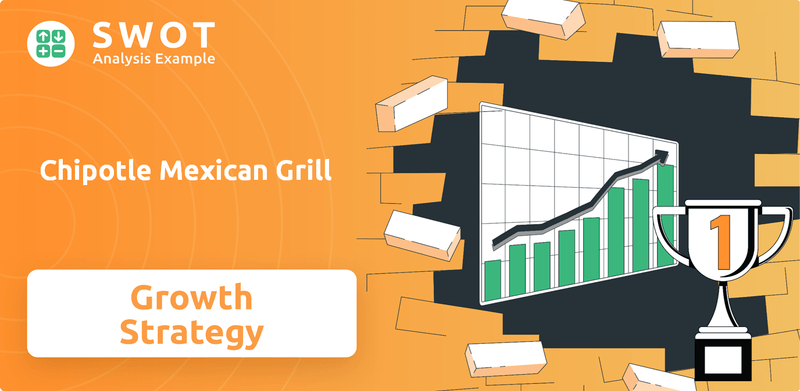
This article dives deep into the Chipotle Mexican Grill SWOT Analysis, examining its future prospects and the strategies driving its continued success. We'll explore Chipotle's expansion plans, technological innovations, and financial performance, providing a comprehensive restaurant industry analysis. Understanding the Chipotle business model and its ability to adapt to market dynamics is crucial for investors and strategists alike, offering insights into long-term investment potential and the competitive landscape.
How Is Chipotle Mexican Grill Expanding Its Reach?
The Chipotle growth strategy is heavily focused on expanding its physical presence and enhancing customer convenience. This approach is designed to increase market share and accessibility for customers. The company is strategically targeting various markets to maintain its growth trajectory.
Chipotle Mexican Grill is actively pursuing an aggressive expansion strategy, primarily focused on increasing its physical footprint and enhancing customer access. This strategy includes both domestic and international expansion, with a strong emphasis on digital ordering and convenience through Chipotlanes. The company's plans reflect a commitment to sustained growth within the fast-casual dining sector.
The company's expansion plans involve opening a significant number of new restaurants, with a substantial portion including Chipotlanes. Menu innovation and strategic partnerships are also key components of the Chipotle business model, supporting its long-term growth objectives. This multi-faceted approach aims to strengthen its market position and drive customer engagement.
In 2025, Chipotle aims to open between 315 and 345 new company-owned restaurants. Over 80% of these new locations will feature a 'Chipotlane'. This expansion is a key part of the Chipotle future prospects. In 2024, Chipotle opened 304 new company-owned restaurants.
Chipotlanes are a core element of Chipotle's expansion strategy, enhancing customer convenience. They have proven effective in boosting new restaurant sales and improving margins. This focus on drive-thru lanes reflects the company's adaptation to digital ordering trends.
Chipotle is finding success in smaller markets across the U.S., with unit economics comparable to larger markets. The company's long-term goal is to reach 7,000 North American locations. This strategic approach supports sustained growth.
International expansion is a key focus, with plans to accelerate growth through licensed restaurants in the Middle East. A partnership with Alsea will facilitate Chipotle's entry into the Mexican market by early 2026. This strategy broadens its global footprint.
Beyond new restaurant openings, Chipotle is focused on menu innovation to drive customer engagement. The successful introduction of new protein options and limited-time offers has significantly contributed to growth. To understand the company's target customers, you can read more about the Target Market of Chipotle Mexican Grill.
Chipotle's expansion strategy encompasses several key initiatives to drive growth and enhance customer experience. These initiatives are designed to increase market share and maintain a competitive edge within the restaurant industry analysis.
- Aggressive new restaurant openings, with a focus on Chipotlanes.
- Strategic expansion into smaller U.S. markets with strong unit economics.
- Accelerated international expansion, particularly in the Middle East and Mexico.
- Ongoing menu innovation and limited-time offers to attract and retain customers.
Chipotle Mexican Grill SWOT Analysis
- Complete SWOT Breakdown
- Fully Customizable
- Editable in Excel & Word
- Professional Formatting
- Investor-Ready Format
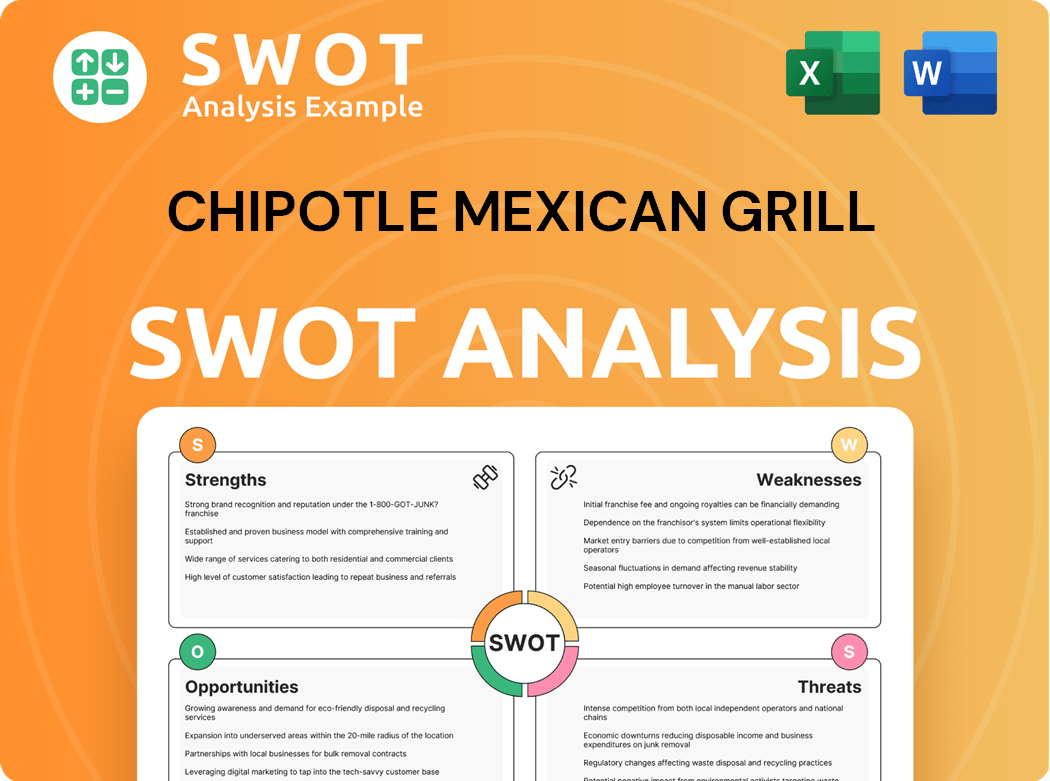
How Does Chipotle Mexican Grill Invest in Innovation?
The company's innovation and technology strategy is crucial for its sustained growth in the competitive fast-casual dining sector. This strategy focuses on enhancing the customer experience, improving operational efficiency, and driving sales through digital channels. By embracing technological advancements, the company aims to streamline processes and maintain its position as a leader in the restaurant industry.
Digital transformation is a cornerstone of the company's strategy. This involves significant investments in digital ordering platforms, including its mobile app and loyalty program. The goal is to foster customer engagement and encourage repeat business. The company's focus on technology is also aimed at adapting to evolving consumer preferences and maintaining a competitive edge.
The company's approach to innovation and technology is multifaceted, encompassing digital sales, automation, and data analytics. These initiatives are designed to improve throughput, reduce labor costs, and enhance the overall guest experience. This integrated approach supports the company's broader growth objectives and long-term investment potential.
Digital sales represent a significant portion of the company's revenue. In the fourth quarter of 2024, digital sales accounted for 34.4% of total food and beverage revenue. This demonstrates the importance of digital channels in driving sales and customer engagement.
The company continues to see growth in digital sales. In the first quarter of 2025, digital sales increased to 35.4% of total food and beverage revenue. This growth highlights the effectiveness of the company's digital initiatives and the increasing preference for online ordering.
The company invests heavily in its mobile app and loyalty program. These platforms are designed to drive customer engagement and encourage repeat business. These tools provide a seamless ordering experience and offer personalized rewards.
The company is rolling out new kitchen equipment to simplify order fulfillment. These technologies are designed to expedite food preparation and improve efficiency. This includes augmented production lines for bowls and salads.
The company is exploring the use of data analytics and AI. These technologies will be used to personalize customer experiences and optimize marketing efforts. This data-driven approach aims to enhance customer satisfaction and drive sales.
Augmented reality is being considered for employee training and customer engagement. This technology can enhance operational efficiency and improve the overall guest experience. This is another way the company is using technology to improve the guest experience.
The company is implementing various technological advancements to enhance its operations and customer experience. These advancements contribute to the company's growth objectives by improving throughput, reducing labor costs, and enhancing the overall guest experience. These efforts are essential for the company's long-term success and its position in the fast-casual dining market.
- Digital Ordering: The company's mobile app and online platforms facilitate convenient ordering and drive customer engagement.
- Kitchen Automation: New equipment and augmented production lines are being introduced to streamline food preparation.
- Data Analytics: AI and data analytics are being used to personalize customer experiences and optimize marketing.
- Augmented Reality: Exploring AR for employee training and customer engagement.
Chipotle Mexican Grill PESTLE Analysis
- Covers All 6 PESTLE Categories
- No Research Needed – Save Hours of Work
- Built by Experts, Trusted by Consultants
- Instant Download, Ready to Use
- 100% Editable, Fully Customizable
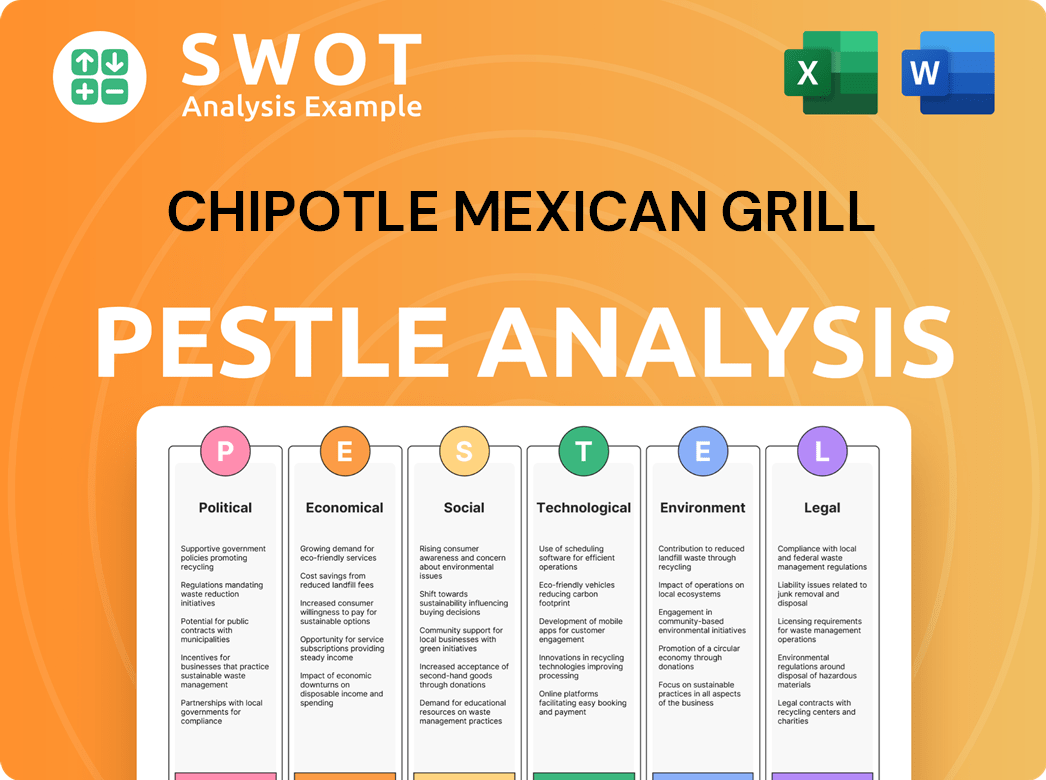
What Is Chipotle Mexican Grill’s Growth Forecast?
The financial outlook for Chipotle Mexican Grill in 2025 indicates continued growth, although at a potentially more moderate pace compared to previous years. The company's Chipotle growth strategy focuses on a blend of new restaurant openings and same-store sales increases to drive revenue. Investors and analysts are closely watching the company's ability to navigate challenges in the restaurant industry analysis, such as rising costs and changing consumer preferences.
In 2024, total revenue for Chipotle reached $11.3 billion, a significant increase from the prior year, primarily fueled by new restaurant openings and a solid increase in comparable restaurant sales. The company's performance in the first quarter of 2025 showed continued revenue growth, driven by new restaurant openings, despite a slight dip in comparable restaurant sales. This mixed performance highlights the importance of a balanced approach to growth, encompassing both expansion and same-store sales improvements.
For the full year 2025, management anticipates comparable restaurant sales growth in the low to mid-single-digit range. This projection reflects a realistic view of the Chipotle future prospects, considering the competitive landscape and economic conditions. The company's ability to maintain this growth rate will be crucial for its long-term financial health and its position within the fast casual dining sector.
Total revenue for 2024 was $11.3 billion, a 14.6% increase from 2023. Comparable restaurant sales increased by 7.4% in 2024. In Q1 2025, total revenue increased by 6.4% to $2.9 billion.
Net income for 2024 was $1.53 billion. Adjusted diluted earnings per share for 2024 were $1.12. The operating margin for 2024 was 16.9%, up from 15.8% in 2023. Restaurant-level operating margin was 26.7% in 2024.
Chipotle repurchased $995.8 million of stock in 2024. As of March 31, 2025, $874.7 million remained available under share repurchase authorizations. The company is actively managing its capital to maximize shareholder value.
The estimated underlying effective full-year tax rate for 2025 is between 25% and 27% before discrete items. This is an important factor for investors to consider when evaluating the company's financial performance.
The Chipotle business model has proven successful, but the company faces challenges. The Chipotle expansion plans 2024 and beyond must consider factors such as the Chipotle market share analysis, which reveals intense competition. To maintain its position, Chipotle is focusing on several strategic initiatives. These include Chipotle menu innovation strategies to attract and retain customers, and Chipotle digital ordering trends to enhance customer experience. The company is also investing in Chipotle customer loyalty programs to build brand loyalty. For a deeper dive into the competitive landscape, consider reading our analysis of the Competitors Landscape of Chipotle Mexican Grill.
The company's ability to drive same-store sales growth is a key indicator of its success. Management is anticipating comparable restaurant sales growth in the low to mid-single-digit range for 2025.
The company's operating margin improved in 2024, showcasing its ability to manage costs and improve efficiency. Restaurant-level operating margin reached 26.7% in 2024.
Chipotle's capital allocation strategy includes share repurchases, which totaled nearly $1 billion in 2024. This strategy reflects management's confidence in the company's financial health.
Analysts generally maintain a bullish outlook on Chipotle stock. The average price target from 34 Wall Street analysts as of May 2025 is $57.68, reflecting positive expectations for the company's performance.
The company is also actively managing the Chipotle impact of inflation, which can affect food costs and operating expenses. Effective supply chain management is crucial.
New restaurant openings are a key driver of revenue growth. The company continues to focus on Chipotle new restaurant openings as part of its expansion strategy.
Investors should consider several factors when evaluating Chipotle's Chipotle stock forecast and Chipotle long term investment potential. These include:
- Same-store sales growth trends.
- Profitability margins and cost management.
- The effectiveness of Chipotle international expansion strategy.
- The ability to adapt to changing consumer preferences.
- The impact of Chipotle supply chain management.
Chipotle Mexican Grill Business Model Canvas
- Complete 9-Block Business Model Canvas
- Effortlessly Communicate Your Business Strategy
- Investor-Ready BMC Format
- 100% Editable and Customizable
- Clear and Structured Layout
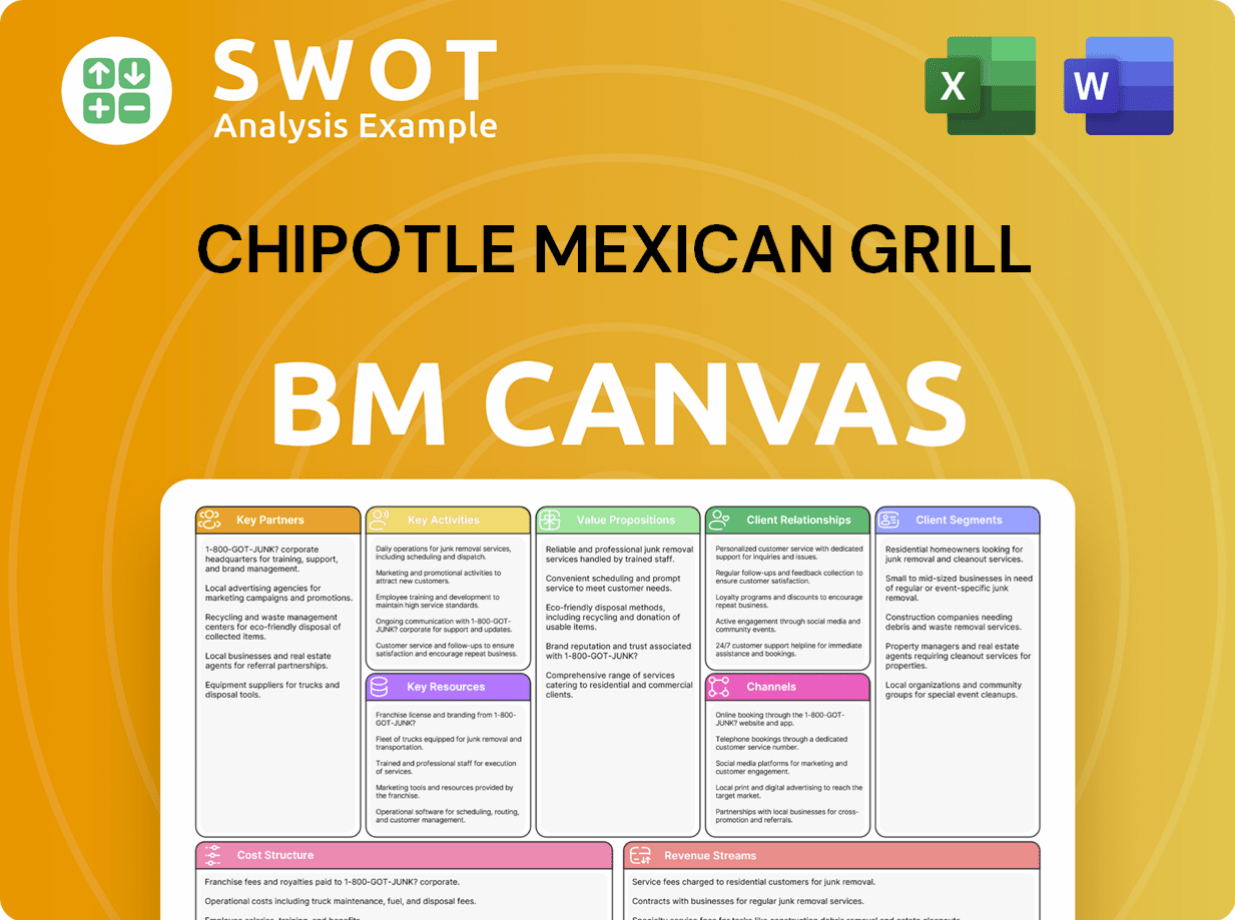
What Risks Could Slow Chipotle Mexican Grill’s Growth?
The growth strategy of Chipotle Mexican Grill faces several risks and obstacles that could impact its future prospects. The fast-casual restaurant sector is highly competitive, and factors like rising costs, supply chain vulnerabilities, and economic uncertainties pose significant challenges. Understanding these potential issues is crucial for assessing Chipotle's long-term investment potential and overall success.
Chipotle's business model and expansion plans are subject to various external and internal pressures. These include market dynamics, operational costs, and macroeconomic conditions. A detailed analysis of these factors is essential for investors and stakeholders to make informed decisions about the company’s future.
The company’s ability to navigate these risks effectively will determine its ability to sustain growth and maintain its market position. This comprehensive look at potential challenges will help provide a clearer picture of the company's trajectory in the competitive restaurant industry.
Chipotle operates in a competitive fast-casual dining environment, where rivals such as Qdoba, Moe's, and others compete for market share. The restaurant industry analysis reveals that competitors like McDonald's have significant scale advantages. Differentiation is key to maintaining a strong position.
Rising costs, particularly for food, beverages, and packaging, threaten profit margins. In the fourth quarter of 2024, these costs reached 30.4% of total revenue. Labor costs are also increasing, with hourly wages projected to rise by 4.5-5.5% in 2025, especially in California.
Supply chain issues, especially concerning key ingredients like avocados and dairy, can impact profitability and consistency. Food safety concerns, while addressed by Chipotle's commitment to fresh ingredients, have historically presented challenges. These challenges can affect the company's reputation.
An uncertain macroeconomic environment, including high inflation and recession fears, can decrease consumer spending, affecting store traffic and sales. The impact of inflation is a key factor. The company must monitor and adapt to changing economic conditions.
Chipotle's reliance on third-party delivery services also presents associated risks. These risks include potential disruptions and impacts on customer experience. Managing these relationships is critical to maintaining service quality.
Workplace violence incidents, as highlighted by attacks on workers in 2024, present a safety risk and can impact employee retention. These incidents require proactive safety measures and management strategies. Addressing these issues is essential for employee well-being.
Chipotle's management addresses these risks through diversification, investments in operational efficiencies, and continuous monitoring of market conditions. Implementing effective supply chain management is essential to mitigate ingredient-related risks. The company also focuses on menu innovation strategies to attract and retain customers.
The company's financial performance review indicates a need to manage rising costs effectively. The impact of tariffs, introduced in April 2025, is projected to raise food costs further, with an estimated 50 basis point annual impact. Understanding these factors is crucial for investors looking at the Chipotle stock forecast.
Chipotle's competitive landscape includes both direct and indirect competitors. The fast casual dining sector is highly competitive, requiring constant adaptation. Strategies to maintain market share include customer loyalty programs and enhanced digital ordering trends. For more details on the company's business model, see Revenue Streams & Business Model of Chipotle Mexican Grill.
Chipotle's long term investment potential depends on its ability to navigate these challenges. This includes its international expansion strategy and its approach to sustainability initiatives. The company must balance growth with risk management to ensure sustained success.
Chipotle Mexican Grill Porter's Five Forces Analysis
- Covers All 5 Competitive Forces in Detail
- Structured for Consultants, Students, and Founders
- 100% Editable in Microsoft Word & Excel
- Instant Digital Download – Use Immediately
- Compatible with Mac & PC – Fully Unlocked
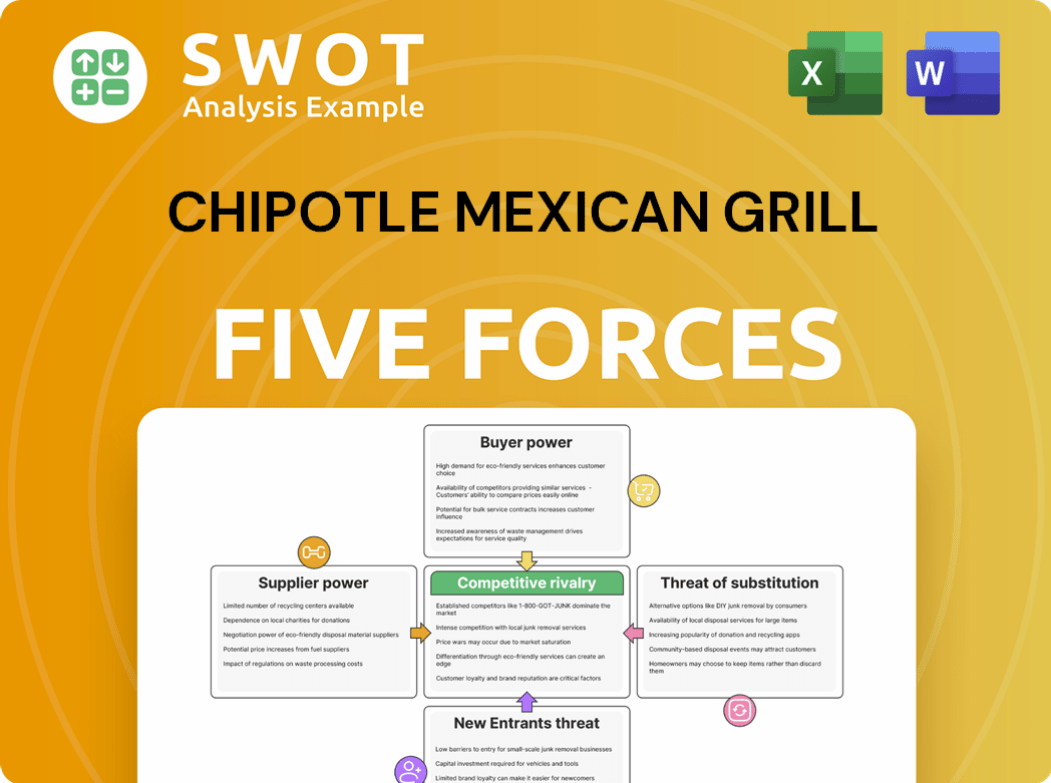
Related Blogs
- What are Mission Vision & Core Values of Chipotle Mexican Grill Company?
- What is Competitive Landscape of Chipotle Mexican Grill Company?
- How Does Chipotle Mexican Grill Company Work?
- What is Sales and Marketing Strategy of Chipotle Mexican Grill Company?
- What is Brief History of Chipotle Mexican Grill Company?
- Who Owns Chipotle Mexican Grill Company?
- What is Customer Demographics and Target Market of Chipotle Mexican Grill Company?
Disclaimer
All information, articles, and product details provided on this website are for general informational and educational purposes only. We do not claim any ownership over, nor do we intend to infringe upon, any trademarks, copyrights, logos, brand names, or other intellectual property mentioned or depicted on this site. Such intellectual property remains the property of its respective owners, and any references here are made solely for identification or informational purposes, without implying any affiliation, endorsement, or partnership.
We make no representations or warranties, express or implied, regarding the accuracy, completeness, or suitability of any content or products presented. Nothing on this website should be construed as legal, tax, investment, financial, medical, or other professional advice. In addition, no part of this site—including articles or product references—constitutes a solicitation, recommendation, endorsement, advertisement, or offer to buy or sell any securities, franchises, or other financial instruments, particularly in jurisdictions where such activity would be unlawful.
All content is of a general nature and may not address the specific circumstances of any individual or entity. It is not a substitute for professional advice or services. Any actions you take based on the information provided here are strictly at your own risk. You accept full responsibility for any decisions or outcomes arising from your use of this website and agree to release us from any liability in connection with your use of, or reliance upon, the content or products found herein.